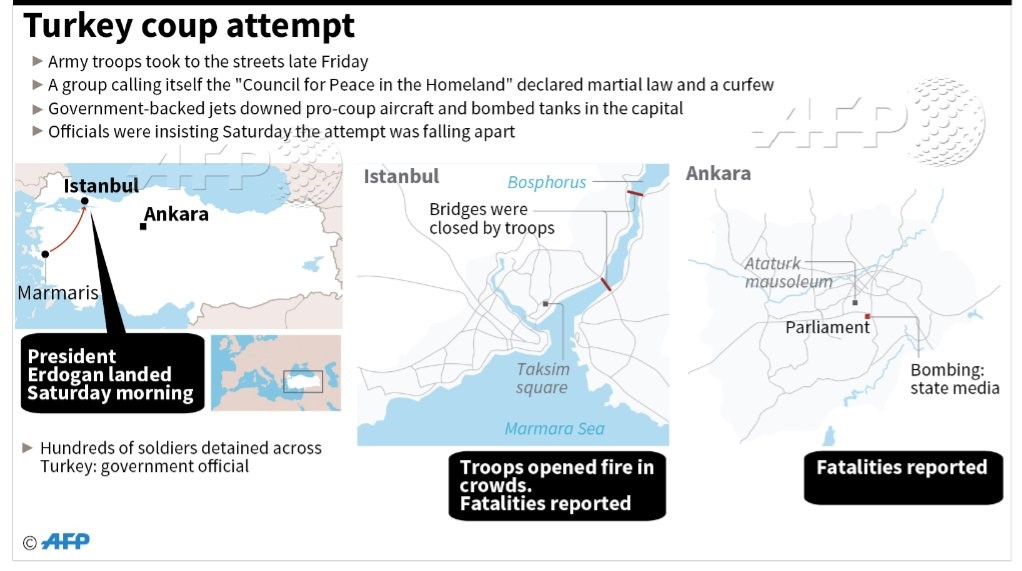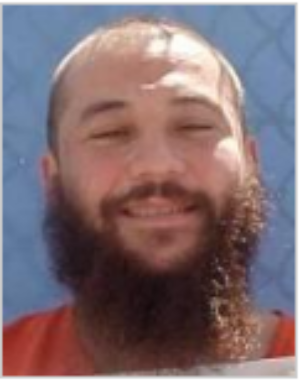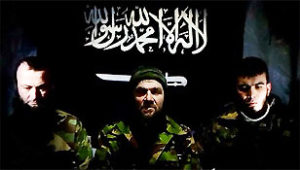Recep Erdogan said he would punish the United States for giving sanctuary to Fethullah Gulen and refusing to extradict him back to Turkey. Gulen, once an ally of Erdogan fled to the United States in 1999 and lives in Pennsylvania.
An angry dictator, Erdogan is now punishing the United States military, when the U.S. is the lead nation of NATO, of which Turkey is also a member. In general back and forth phone calls, Erdogan is making key demands beyond that of Gulen including deeper retribution to those in the West that helped coordinate the coup against him. By all appearances and a deeper examination, this coup has all the signals of a staged operation by Erdogan himself. He is a master manipulator and has kept the borders between Turkey and Syria wide open where Islamic fighters for al Qaeda, al Nusra and Islamic State for the most part travel freely even with major pressure from the West to stop.
Turkey closes air space over Incirlik, grounding US aircraft at base
Stripes/STUTTGART, Germany — U.S. military operations against the Islamic State group out of Turkey’s Incirlik Air Base came to a halt Saturday afternoon as the Turkish military closed the airspace around the base following an attempted coup, a Pentagon spokesman said.
Power also was cut to the base and the U.S. was restricting movements of its personnel as base security was raised to the highest level.
“The Turkish government has closed its airspace to military aircraft, and as a result, air operations at Incirlik Air Base have been halted at this time,” Pentagon Press Secretary Peter Cook said in a statement. “U.S. officials are working with the Turks to resume air operations there as soon as possible.”
Hours earlier, a U.S. defense official said U.S. air operations from the base had not been affected and were continuing against Islamic State targets in Iraq and Syria.
Turkish authorities told the U.S. they were closing the air space until they could be sure all Turkish air force assets were under government control, CNN reported, citing a U.S. defense official.
U.S. planes that had already flown out on missions were allowed to land, CNN reported.
The power cuts to the base had not affected base operations, Cook said: “U.S. facilities at Incirlik are operating on internal power sources.”
The U.S. Embassy said in a post on its website that local authorities were denying movement on and off the Turkish owned and operated base. But a spokesman for U.S. European command said that did not apply to U.S. personnel.
“There was not chaos at this base,” said EUCOM spokesman Navy Capt. Danny Hernandez, describing conditions at Incirlik. “All our assets in Turkey are fully under control and there was no attempt to challenge that status.”
Given that the base has moved to DELTA — the highest level of security, all U.S. personnel are restricted to Incirlik by U.S. order, Hernandez said.
While there have been reports that Incirlik has been surrounded by authorities, limiting the movement of U.S. personnel, Hernandez said that is not the case.
“We are already at DELTA, which makes security thicker,” said Hernandez, who added base officials were working to restore commercial power on base.
Measures were being taken to ensure the safety of personnel operating out of Turkey, Cook said. “We continue our efforts to fully account for all Department of Defense personnel in Turkey. All indications at this time are that everyone is safe and secure,” Cook said. “We will continue to take the necessary steps to ensure the safety and security of our servicemembers, our civilians, their families and our facilities.”
NATO Secretary-General Jens Stoltenberg tweeted earlier in the day that he had confirmed in a Saturday phone call with NATO Supreme Allied Commander Gen. Curtis M. Scaparrotti, who also heads U.S. European Command, that all U.S. and NATO personnel in Turkey were safe and accounted for.
“Turkey is a strong NATO ally and an important partner in the international coalition against ISIL,” Scaparrotti said in a statement, using an acronym for the Islamic State group. His statement did not address the current state of operations at Incirlik. “I am intently monitoring and assessing the security situation and will continue working closely with the U.S. Department of State and our allies to ensure every possible effort is taken to safeguard our servicemembers, civilians and their families — plus continue to focus on our operations against ISIL.”
Cook said that while air operations at the Turkish-owned and operated base were halted, the U.S. was “adjusting flight operations in the counter-ISIL campaign to minimize any effects on the campaign.”
The U.S. has been launching strikes against the Islamic State group in Iraq and Syria from other staging areas, including aircraft carriers in the Persian Gulf and the Mediterranean.
The reported shutdown illustrates how the attempted coup against the government of President Recep Tayyip Erdogan threatens to complicate how the U.S. and its NATO allies work with a country on the front lines of the fight against the Islamic State group.
Turkey, by virtue of geography, is a crucial player in the U.S.-led campaign to target Islamic State militants in neighboring Iraq and Syria.
Secretary of State John Kerry, in remarks in Luxembourg Saturday said that hadn’t changed.
“As of this moment, Turkey’s cooperation with us in our counterterrorism efforts, in our NATO obligations, and in our regional efforts with respect to Syria and ISIS have not been affected negatively,” Kerry said, using another acronym for the Islamic State group. “All of that has continued as before.”
However, Turkey has frustrated the West with its failure to aggressively confront the back and forth flow of extremists across Turkey’s southern border. Turkey has long been the key point of transit for Islamic State fighters and others moving in and out of Syria. Critics have accused the Erdogan government of turning a blind eye to such militants, who have fought against Turkey’s nemesis Bashar Assad in Syria.
Turkey also regards Kurdish forces — a key U.S. ally in the fight against the Islamic State — as its primary enemy, thereby complicating U.S. efforts to build a coherent alliance.
In recent months, Turkey also has increasingly become a target for terrorists, who have conducted major strikes in Istanbul and Ankara, exposing Turkey’s own vulnerability to attacks from militants.
In March, such concerns led EUCOM to order military family members based at Incirlik and other smaller facilities to depart the country, ending the longtime presence of military dependents in Turkey.
Currently, the U.S. has about 2,500 troops in Turkey mostly based at Incirlik and deployed in the fight against the Islamic State group.
The U.S. also operates out of Diyarbakir Air Base near Turkey’s border with Syria as well as a NATO facility in Izmir and Aksaz Naval Base along the Aegean Sea. There was no word on whether flights out of Diyarbakir were also halted.
Turkey has long been a complicated, sometimes unreliable partner in the fight against the Islamic State. After the U.S.-led air campaign against the Islamic State began in 2014, Turkey at first resisted U.S. requests to launch strikes form Turkish territory, which would shrink flight times for U.S. fighters and drones targeting militants.
After a wave of terrorist attacks, Ankara reversed course in the summer of 2015 and allowed strike operations out of Incirlik, where A-10s, F-15s and drones have routinely taken part in missions. NATO surveillance aircraft also have operated form Turkish facilities.
Stoltenberg, calling Turkey a “valued NATO ally,” appealed for calm and restraint “and full respect for Turkey’s democratic institutions and its constitution.”
For the U.S., how the crisis unfolds could determine whether military operations can continue in Turkey. In past coups or coup attempts since 1960, U.S. and NATO bases and troops were never affected. But if the government fails to maintain the upper hand it claimed on saturday to have, the U.S. could be bound by laws that prohibit partnering with countries where military forces overthrow a democratically elected government.
It is not always cut and dry. In Egypt, the U.S. temporarily cut off aid in 2012 when a democratically elected government was overthrown, but financial support resumed after coup leader Abdel Fattah al-Sisi was elected president, amid concerns about Islamic extremists in the country.
Given Turkey’s status as a NATO ally and a front-line state in the fight against the Islamic State group, Washington could look for a legal workaround even if a coup were to succeed.
For now, the U.S. is backing the government and urging calm.
After talking with President Obama late Friday, Kerry said, “we agreed directly at that time … that the United States, without any hesitation, squarely and unequivocally stands for democratic leadership, for the respect for a democratically elected leader, and for a constitutional process in that regard, and we stand by the government of Turkey.”













